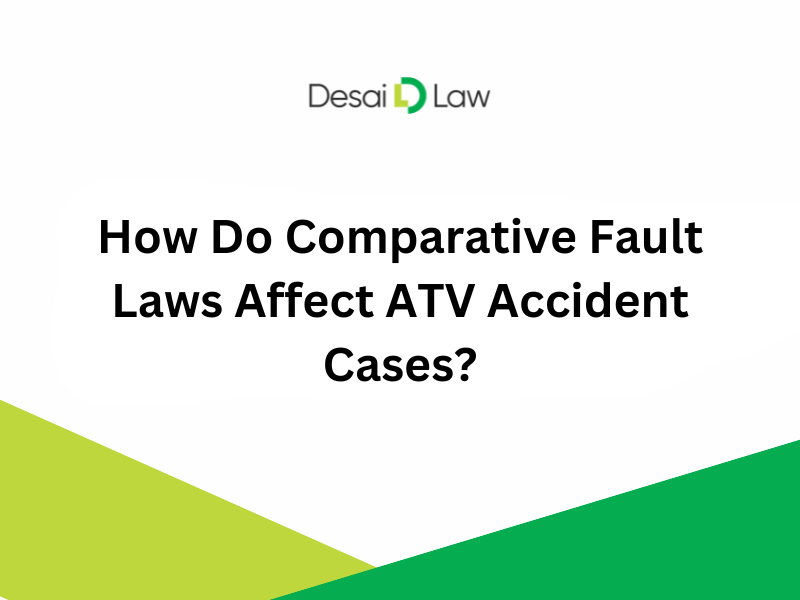As the summer months approach, many West Virginians look forward to enjoying the great outdoors on their all-terrain vehicles (ATVs). However, with this excitement comes the potential for accidents and injuries.
If you or a loved one has been involved in an ATV accident in West Virginia, you’ll need to understand how the state’s comparative fault laws may impact your legal case. Let’s go over the concept of comparative fault and discuss how it can affect the outcome of an ATV accident claim.
If you find yourself in need of legal assistance, don’t hesitate to contact a skilled West Virginia ATV accident lawyer to protect your rights and seek the compensation you deserve.
Understanding Comparative Fault in ATV Accidents
Comparative fault, also known as comparative negligence, is a legal principle that comes into play when multiple parties are found to be at fault for an accident. In West Virginia, the state follows a modified comparative fault rule, which means that an injured party can recover damages as long as their share of fault does not exceed 50%. If the injured party is found to be 51% or more at fault, they may be barred from recovering any compensation.
Let’s consider an example to illustrate how comparative fault works in an ATV accident case. Suppose two ATV riders, John and Sarah, collide on a trail. John suffers severe injuries and decides to file a lawsuit against Sarah for damages. During the trial, the jury determines that John was 30% at fault for the accident, while Sarah was 70% at fault.
Under West Virginia’s modified comparative fault rule, John would be entitled to recover damages, but his award would be reduced by his percentage of fault. So, if the jury awarded John $100,000 in damages, he would ultimately receive $70,000 due to his 30% share of fault.
The Role of Insurance Companies in West Virginia ATV Accidents
In many ATV accident cases, insurance companies play a large role in determining fault and negotiating settlements. It’s important to remember that insurance adjusters are trained to minimize payouts and protect their company’s bottom line. They may attempt to shift blame onto you or downplay the severity of your injuries to reduce the amount of compensation they have to pay.
This is where having an experienced West Virginia ATV accident lawyer on your side can make a significant difference. At Desai Law, we can handle communication with the insurance companies, gather evidence to support your claim, and fight for the full and fair compensation you deserve.
Gathering Evidence to Support Your WV ATV Accident Claim
To build a strong case and maximize your chances of success, it’s crucial to gather as much evidence as possible to support your claim. This may include:
- Police reports and accident scene photos
- Witness statements
- Medical records and bills
- Lost wage documentation
- Expert testimony (e.g., accident reconstruction specialists, medical professionals)
At Desai Law, our West Virginia ATV accident team can help you compile this evidence and use it to demonstrate the extent of your damages and the other party’s fault. We can also work with experts to strengthen your case and provide valuable insights into the accident’s cause and the long-term impact of your injuries.
Damages in ATV Accident Cases
If you’ve been injured in an ATV accident in West Virginia, you may be entitled to several different types of damages, depending on the circumstances of your case.
These may include:
Medical Expenses (Past and Future)
If you’ve been injured in an ATV accident, one of the most significant types of damages you may be entitled to is compensation for your medical expenses. This includes any costs you’ve already incurred for treatment related to the accident, such as emergency room visits, surgeries, medications, and physical therapy. It also includes any future medical expenses you’re likely to face as a result of your injuries, such as ongoing rehabilitation, follow-up appointments, and long-term care.
It’s important to keep detailed records of all your medical bills and expenses related to the accident, as these will be helpful in proving the extent of your damages. Our West Virginia ATV accident team can help you gather this documentation and work with medical experts to estimate the cost of your future medical needs.
Lost Wages and Earning Capacity
In addition to medical expenses, you may also be entitled to compensation for any income you’ve lost as a result of the accident. This includes wages you’ve missed out on while recovering from your injuries, as well as any future income you may lose if your injuries prevent you from returning to work or limit your ability to earn a living.
To prove your lost wages, you’ll need to provide documentation such as pay stubs, tax returns, and a letter from your employer confirming your absence from work. If your injuries have impacted your future earning potential, we may work with economic experts to calculate the long-term financial impact of the accident on your career and income.
Pain and Suffering
Pain and suffering are types of non-economic damage. It reimburses you for the physical pain/discomfort you’ve experienced as a result of the accident. This can include not only the immediate pain of your injuries but also any chronic pain or ongoing physical limitations you may face in the future.
Proving pain and suffering can be more challenging than demonstrating economic damages like medical expenses and lost wages, as there is no clear dollar amount associated with this type of harm. However, our West Virginia ATV accident team can use evidence such as medical records, expert testimony, and your own personal account of your experiences to build a strong case for pain and suffering damages.
Emotional Distress
Emotional distress is another type of non-economic damage that compensates you for the psychological impact of the accident and your injuries. This can include feelings of anxiety, depression, fear, and post-traumatic stress disorder (PTSD) that may arise in the aftermath of a traumatic event like an ATV crash.
To prove emotional distress, we may use evidence such as testimony from mental health professionals, medical records documenting your psychological symptoms, and statements from family and friends who have witnessed the impact of the accident on your emotional well-being.
Property Damage
If your ATV or other personal property was damaged in the accident, you may be entitled to compensation for the cost of repairs or replacement. This can include not only the ATV itself but also any gear, clothing, or other belongings that were lost or damaged in the crash.
To prove that you have suffered property damage, you’ll need to provide documentation such as receipts for replacement items, repair estimates, and photos of the damaged property. As your West Virginia ATV accident lawyer, Chirag Desai can help you gather this evidence and negotiate with insurance companies to ensure you receive fair compensation for your losses.
Loss of Enjoyment of Life
Loss of enjoyment of life is a type of non-economic damage that compensates you for the ways in which your injuries have diminished your ability to take part in the activities and experiences that were important to you before the accident. This can include hobbies, social events, travel, and other aspects of your daily life that may have been limited or eliminated due to your injuries.
Proving loss of enjoyment of life can be challenging, as it involves demonstrating the intangible ways in which the accident has affected your quality of life. However, our West Virginia ATV accident team can use evidence such as testimony from family and friends, documentation of your activities before and after the accident, and your own personal account of the limitations and challenges you’ve faced to build a strong case for these damages.
West Virginia ATV accident lawyer Chirag Desai can help you assess the full extent of your damages and fight for the compensation you need to cover your losses and move forward with your life.
Time Limits for Filing an ATV Accident Claim
It’s important to note that West Virginia has a statute of limitations for personal injury claims, including those involving ATV accidents. In most cases, you have two years from the date of the accident to file a lawsuit.
However, there are some exceptions to this rule, such as cases involving minors or instances where the injuries were not immediately apparent. Our West Virginia ATV accident team can help you understand the specific deadlines that apply to your case and ensure that your claim is filed promptly.
Contact a Skilled West Virginia ATV Accident Lawyer Today
Don’t wait to seek legal counsel if you’ve been injured in an ATV accident this summer. Contact West Virginia ATV accident lawyer Chirag Desai today at (304) 974-1974 to schedule a consultation and learn more about your options. With our legal team on your side, you can focus on your recovery while we fight for the justice and compensation you deserve.





